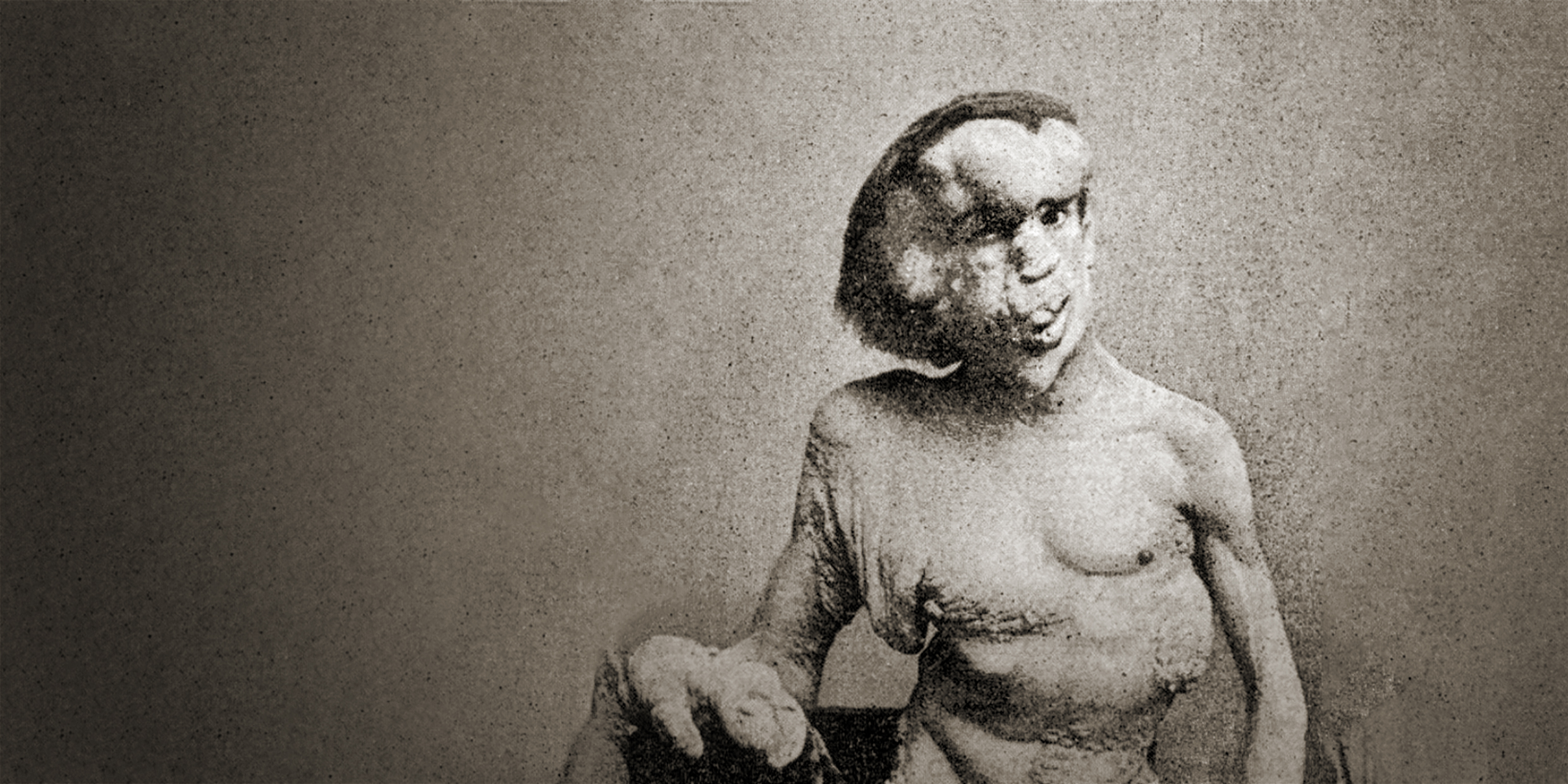Originally published 3 July 1995
On my desk is a blueberry gall, given to me by a student who wanted to know what it was.
It is an abnormal growth of the blueberry stem caused by a tiny wasp, Hemadas nubilipennis. The adult wasp lays its eggs on new growth in early summer. The larvae hatch, burrow into the stem, and secrete a chemical that causes the blueberry to grow a lumpish swelling, which usually distorts the twig into a U shape.
In the cozy interior of the gall, a dozen or so wasp grubs pass the winter. In spring, they nibble their way to just under the gall’s skin, metamorphose into adult wasps, then push out into the world. If you find a gall later in the season, it will be riddled with escape tunnels, each a millimeter or so in diameter.
The gall on my desk appears to be a misshapen little man, with escape holes for eyes, a crease for a mouth, and protruding bits of blueberry stem for limbs.
The image is familiar. The man’s name is Joseph Merrick.
I fetch a biography of Merrick from the library, with pictures of the subject drawn from life. I place the blueberry gall next to the pictures. The likeness is uncanny.
Merrick is known to history as the Elephant Man. He looked — well, like a blueberry gall. Huge lumpish growths on his head, back, buttocks, and legs. Slabs of reptilian skin. Twisted bones. One arm slender and normal, the other a grotesque tuber. Healthy in mind, with normal genitals and sexual appetites, Merrick was nevertheless so monstrous in appearance that he ignited fear and loathing in all who saw him.
He was born in Leicester, England, in 1861, and was abandoned by his mother to a workhouse at age 3 or 4. As a young man, he allowed himself to be exhibited as a freak as his only way of making a living. In his twenties, he was “rescued” from this odious fate and given a room in which to live at London Hospital. Even his nurses could not bear to look upon him. If he appeared in the street without a mask and all-covering cloak, a riot was sure to follow.
The Victorians were fascinated with Merrick. In his hospital chamber, called the Elephant Room, he was visited by members of the medical establishment, celebrities and royalty. They gawked; they were repelled; they spoke platitudes. He invested in them, one imagines, a feeling of smug superiority, an opportunity to practice their Christianity, to love (or pretend to love) the utterly unlovable.
Fascination with Merrick has continued into our own century. He has been the subject of several books — one by the doctor who rescued him from public exhibition, another by the anthropologist Ashley Montagu. He has inspired an award-winning play by Bernard Pomerance and a film by David Lynch.
The Elephant Man endures as a cultural icon because his very existence challenges our faith in the goodness of nature.
We assert that “beauty is skin-deep,” but we believe in our heart- of-hearts that physical brokenness somehow denotes a moral flaw, if not of the broken person, then of nature itself.
The word “monstrous” means both “deformed” and “evil.”
What lapse in creation allows cells to run so rampant as to turn the body of a man into something so bizarre? What evil twist of genes gives rise to a man with the soul of Ariel and the body of Caliban? We can’t seem to accept this terrible brokenness in a human life without evoking the action of a malignant Satan, or a God who sees and punishes our secret sins.
The gall manikin on my desk suggests another interpretation. The disfigurement of the blueberry plant has no moral subtext. A fly inserts an egg. A larva excavates and secretes. A genetic chemistry is disturbed. The resulting deformity has been perfected by nature over millions of years. The blueberry plant is not disadvantaged by the gall; the fly achieves an edge in the struggle to survive and reproduce.
For all its strange appearance, the gall is no more good or evil than the peacock’s feather, the orchid’s blossom, or any other product of evolution.
Only in humans do we count the disfigurements of genes or diseases as morally debased. But the agents of disfigurement — viruses, bacteria, aberrant genes — are following a script written into their chemistry. Merrick’s body was awry at birth. A genetic flaw made his thin frame the bearer of ghastly gall-like growths. No God punished him. No Satan worked evil. The script for that poor man’s misfortune was in the DNA of his wretchedly fissioning cells.
The chemistry of life is not animated by love or justice or pity. Humans can love nature, but they are not loved in return. Joseph Merrick died in his sleep at age 29, suffocated by the burgeoning excrescence of his own head.



